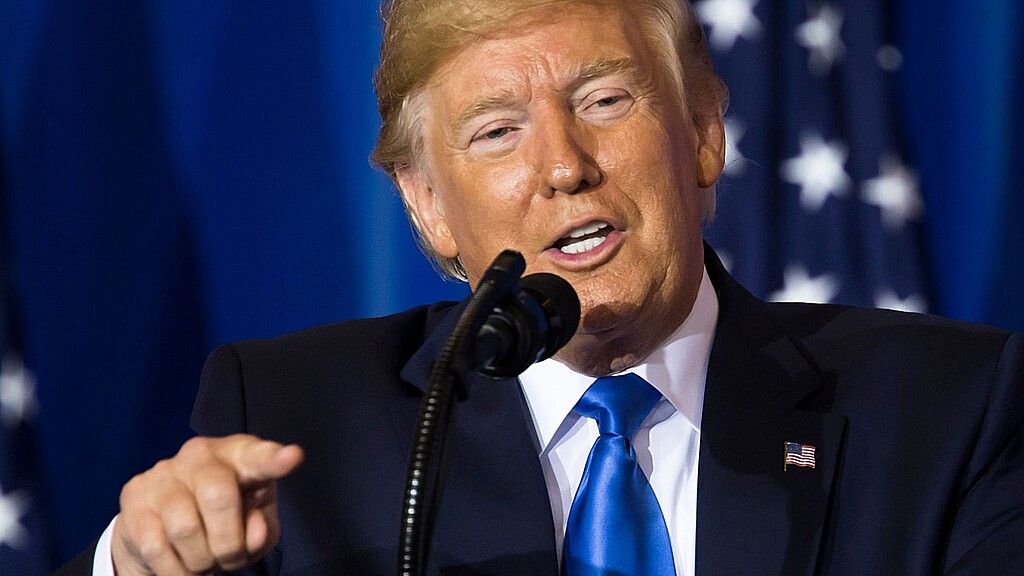Politics
Colorado Supreme Court disqualifies Trump from state primary under U.S. constitutional insurrection provision
Tuesday’s Colorado Supreme Court ruling makes the state the first in the nation to remove Trump from a ballot, a decision that certain to stir up a major battle in the Supreme Court

December 19, 2023 9:51pm
Updated: December 19, 2023 9:53pm
The Colorado Supreme Court on Tuesday ruled that former President Donald Trump participated in an insurrection against the United States as part of the Jan. 6, 2021, U.S. Capitol riots, and is ineligible to appear on the 2024 Republican presidential primary ballot, according to widespread media reports.
The embattled former president is currently a facing a mountain of lawsuits from various states aiming to disqualify him from next year’s primary and presidential ballots.
The lawsuits have specifically argued he is ineligible to run again under a clause in the 14th Amendment that prohibits those who participated in an “insurrection” against the United States government from holding high office.
The Colorado Supreme Court decided to hear the case earlier this month after a lower court U.S. District Court federal judge ruled that Trump engaged in an insurrection by inciting the Jan. 6 riot.
Still, that judge allowed the former president to remain on the primary ballot because the court asserted that the 14th Amendment was not applicable to the commander in chief.
Tuesday’s Colorado Supreme Court ruling makes the state the first in the nation to remove Trump from a ballot, a decision that certain to stir up a major battle in the Supreme Court.
To that end, the Colorado Supreme Court has stayed its ruling until Jan. 4 since the U.S. Supreme Court returns for conference on Jan. 5.
“We do not reach these conclusions lightly,” the court wrote. “We are mindful of the magnitude and weight of the questions now before us. We are likewise mindful of our solemn duty to apply the law, without fear or favor, and without being swayed by public reaction to the decisions that the law mandates we reach.”
Some of the presidents allies—and critics spoke out against the ruling, insisting it was a case of judicial overreach.
Republican National Committee Chairwoman Ronna McDaniel lashed out at the Colorado Supreme Court's decision, calling the ruling “election interference” in a post to X, and declared that the Republican National Committee's legal team “looks forward to helping fight for a victory.”
House Speaker Mike Johnson said the ruling was “nothing but a thinly veiled partisan attack,” arguing that voters should be able to decide for themselves who they want to nominate for president. .
"Regardless of political affiliation, every citizen registered to vote should not be denied the right to support our former president and the individual who is the leader in every poll of the Republican primary," Johnson said.
Former New Jersey Gov. Chris Christie opposed the decision as a matter of due process.
Christie said he believes it would be "bad for the country" if Trump were kept off a ballot by a judicial ruling because no criminal trial has proven Trump incited an insurrection.
"But what I will say is this, I do not believe Donald Trump should be prevented from being president of the United States by any court. I think he should be prevented from being president of the United States by the voters in this country," he explained.
Former Ambassador Nikki Haley said ballot decisions should not be decided by courts.
“We don’t need to have judges making these decisions, we need voters to make these decisions. So, I want to see this in the hands of the voters. We’re going to win this the right way. We’re going to do what we need to do, but the last thing we want is judges telling us who can and can’t be on the ballot,” Haley said.
Secretary of State Jenna Griswold however, told CNN’s Pamela Brown on “AC360” she will follow the court’s decision and admitted her own concurrence with the court’s decision.
“My job as secretary of state is to make sure that only qualified candidates appear on our ballot,” she told Brown. “I, of course, will follow whatever court decision is in place.”
Griswold also admitted she personally believes Trump “incited the insurrection and that it's up to a court to determine whether that incitement disqualifies him from further holding office under the Constitution.”
“This is exactly how Colorado law is set up,” she insisted. “Everyday voters can file a lawsuit to have a court weigh in.”
“I do disagree with the dissent, but ultimately it is up to the court systems,” Griswold said, adding that she does not think “it is impossible or not permissible under Colorado law to disqualify a candidate from the presidential primary.”
But this does not necessarily mean Trump will not appear on the ballot in the Rocky Mountain state. The former president could remain on Colorado’s ballot if he appeals the state Supreme Court’s ruling.
If Trump asks the U.S. Supreme Court to step in by Jan. 4, the decision will remain paused, according to Steve Vladeck, a professor at the University of Texas Law School and CNN Supreme Court analyst.
That means Trump would “almost certainly” remain on the state’s primary ballot on March 5, he told the national news network.










